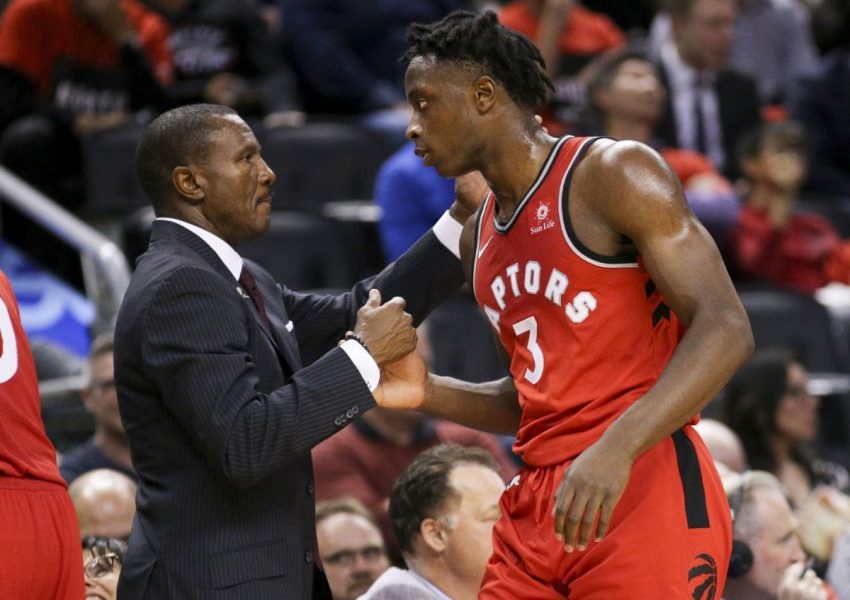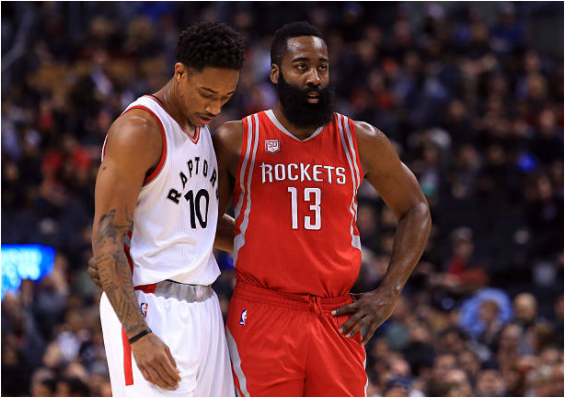We’re only twelve games into the season, but a narrative is emerging for the Raptors this year. They beat up on lesser teams, with a 6-0 record against teams currently under .500, and many of those victories in an imposing fashion. In those games, we’ve seen improved passing, expanded shot selection and indications that the promised culture change might be actually happening as the team goes away from isolation-basketball to run up the score on teams.
The problem is, we’re twelve games into the season, and that narrative only covers half of the games. In the other half, there are two bad losses, against Washington and at Denver, games in which the Raptors just didn’t come out with enough energy or fight on either end of the floor and weren’t ever really in the game.
That leaves us with four games. A victory over the New Orleans Pelicans, and losses to the San Antonio Spurs, Golden State Warriors and Boston Celtics. The combined margin of defeat for the three losses is just ten points, and in all four of the games the final minutes were critical to deciding the game. Also, in each of the games, the Raptors regressed to the team they’ve been in years past during those closing minutes. The offense became composed of little aside from Kyle Lowry or DeMar DeRozan running down the shot clock and then using the last seven or eight seconds of it to try to get a shot they were comfortable with in isolation against the opposition team’s chosen defender for that assignment, and more and more this season that is DeRozan by himself, with Lowry seeming more deferential in those closing moments. The only difference that separates the New Orleans game as a victory is that in that game it worked, because the Pelicans don’t have an elite wing defender to throw at DeRozan, so he was able to score in those moments.
The other three teams have, in Danny Green, Andre Igoudala, and Jaylen Brown, talented defensive players to throw at DeRozan in those situations, and they know that the shots are coming from his hands. In fact, the Raptors offense often removes the possibility of any other outcome, allowing the defense to pick the shot that decides whether it’s a victory or a defeat. It becomes a game of not whether the Raptors can outscore their opponents, but whether DeMar DeRozan can outscore the opposing team single-handedly. DeRozan is a talented scorer, and he is good at making difficult shots, but an offense of one will always be limiting. It’ll always come down to taking the shots the defense is willing to give you, and not giving the defensive players a chance to really make a mistake.
Defenses, even good ones, make mistakes on switches and rotations from time to time. If you can get a defense moving, they might lose a guy, or struggle getting around a screen, and that opens up an opportunity for the offense. There is a perception that the common complaint of ‘too much isolation’ in the Raptors offense late equates to ‘too much DeRozan’, but you can have movement and still end up with a shot coming from one of the Raptors’ All-Stars. DeRozan is excelling this season both in spot-up and post-up opportunities, and both of those things require him to be catching the basketball before taking his shot. If the ball never leaves his hands, you take those two weapons out of his hands as well. You also don’t give the defense the opportunity to focus too much on DeRozan, allowing other guys to get shots that they wouldn’t otherwise. If you don’t go away from his offense at all, no amount of attention the defense pays to him is too much.
At the end of the day though, this is about the promised culture change. Dwane Casey said after the game last night that he is comfortable with the shot the Raptors took, and that it would go down more often than not. That may be true about DeMar’s shot in the closing seconds, but is that all the Raptors want to be? A team that lives and dies on whether or not DeRozan can outscore opposing teams in the closing minutes of games? If the culture change only applies to moments when the game isn’t on the line, is it really a change, or is it just a concession, is it just saying that they’ll pass the ball and play in a more inclusive manner for three quarters, and the fourth quarter is either garbage time or DeRozan time? In game situations where the Raptors are behind by 5 or less points or tied in the last five minutes this season, DeRozan has a 52.7% usage rate, a 30.0% effective field goal percentage, and a -41.6 net rating. This offense simply isn’t working to get back into close games.
The book is clearly out on the Raptors. The Warriors, Spurs and Celtics didn’t play like the expected anything other than what they got in those fourth quarters, and they won the game by betting that their team could outscore DeRozan, and they were right. Because great teams can’t be beaten by single players, even great ones. If the culture change results in the same outcome, a Raptors team that wins a lot of games during the regular season but falls short in the playoffs when the clock strikes midnight, and the carriage of the Raptors’ new offense turns back into the pumpkin of isolation, what was the point of it all? The old offense got them this far, took them to the Eastern Conference Finals, but was never going to get past the Cavaliers. The new offense, if it doesn’t apply in important situations, will be no different because at this point the new offense is nothing more than the old offense with a better paint job.



